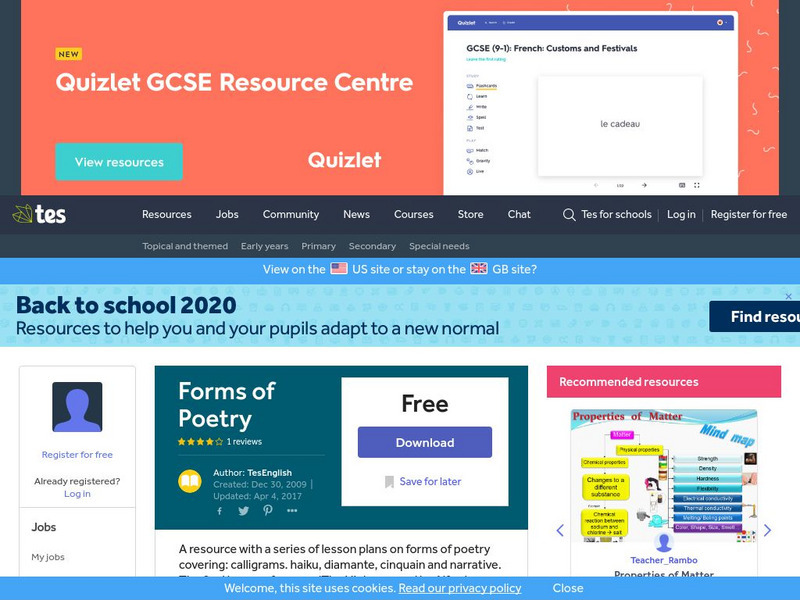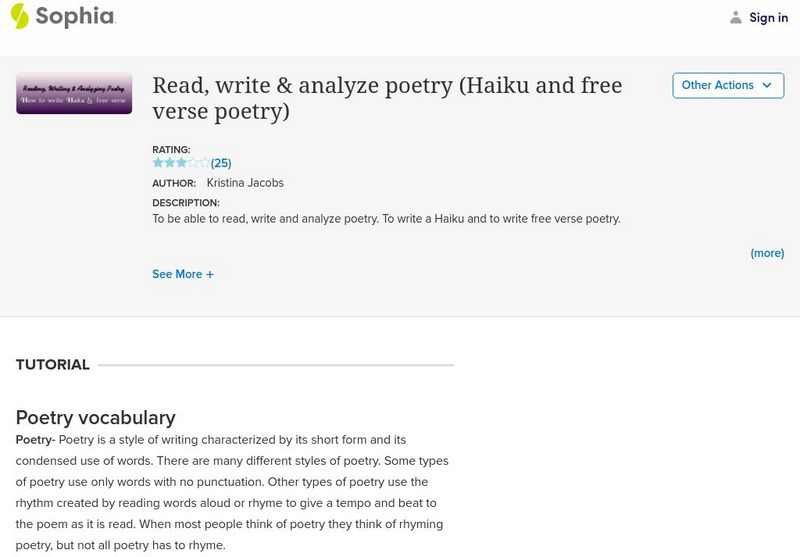Hi, what do you want to do?
Sophia Learning
Sophia: Writing, Reading, and Understanding Poetry
This tutorial focuses on different aspects of poetry: definitions, types of poetry with examples, and how to read, write, and analyze poetry. It includes three videos: a YouTube video of "El Guante" performing a free verse poem, a...
Other
Lexiconic.net: Elements of Poetry
This resource explains how to approach an analysis of a poem. It discusses assumptions people may have, the importance of reading it closely before analyzing it, looking at the stanza structure, the type of poem, the sound patterns,...
Japanese Ministry of Foreign Affairs
Web Japan: Schools
Would you like to know what a 6th grader in Japan studies? Who cleans the classrooms in your school? Read this article to find out all about the school life of Japanese children. Then take the little quiz at the end.
Texas Education Agency
Texas Gateway: Literary Terminology: Practice 5 (English I Reading)
[Accessible by TX Educators. Free Registration/Login Required] To be "in the know" in literature, you need to know the terminology used to describe, interpret, and analyze poetry, drama, and fiction. As you proceed through the sections...
John F. Kennedy Center
The Kennedy Center: Oceans: A Sensory Haiku
In this lesson plan, students use the ocean and their five senses as inspirations to create their own unique haikus. Lesson provides assessment criteria and a list of sources.
National Endowment for the Humanities
Neh: Edsit Ement: Can You Haiku?
Informative lesson for students concerning the writers, descriptions, and characteristics of the haiku. Also allows students to create their own original haiku.
PBS
Pbs Learning Media: Lesson Plan: Grades 7 12: Exploring Selected Haiku by Issa
A lesson plan, based on the work of the Japanese poet Kobayashi Issa, that explores the haiku form of poetry. Students will learn features of a haiku, identify features within Issa's work, and write an original haiku. The lesson plan...
University of Pennsylvania
U Penn: Poetic Terms and Types
Click on these terms for an excellent definition of these poetic terms, some from the Oxford English Dictionary. Includes types of poetry as well as terms.
Authors Calendar
Author's Calendar: Kirjasto: Kobayashi Issa
This site provides both biographical information and some analysis of Issa's work. Links to significant names.
Writing Fix
Writing Fix: Haiku Riddles
In this lesson students will create 4 mystery haikus to publish for an audience.
American Forum for Global Education
American Forum for Global Education: Haiku as a Cultural Icon
These detailed lesson plans let students research about Shiki and Haiku, compose on their own poetry, and learn about Japanese culture.
Other
Lesson Plan: Writing a Haiku
Check out this lesson on haiku that includes samples by Richard Wright. Students and teachers will benefit from this educational tool.
Other
History of Haiku: Basho Matsuo
This site describes Basho's writing style, including his sense of humor. It also provides several examples of his poetry.
Other
Essays and Reviews: Mourning for Hokujurosen: Poem by Yosa Buson
This poem is followed by a brief commentary. The writer explains images in the poem, and some of Buson's philosophical beliefs which affected the poem.
ReadWriteThink
Read Write Think: Haiku Starter
A printable, two-page graphic organizer to help students brainstorm ideas and write a rough draft of a haiku. Directions on how to use this type of graphic organize as well as lists of teaching ideas and related resources are also provided.
ReadWriteThink
Read Write Think: Seasonal Haiku
This site is a three-part lesson that teaches students how to write and depict seasonal imagery through haiku. Students study, listen to, and create original haiku on colored backgrounds.
abcteach
Abcteach: How to Haiku [Pdf]
[Free Registration/Login Required] Wonderful printable haiku form that explains how to write one and leaves room for students to write their own.
Writing Fix
Writing Fix: The Di Ku And/or the Tri Ku [Pdf]
Young scholars use a basic haiku structure to create di-ku and tri-ku poems to demonstrate understanding of a topic. Directions and examples of each are provided.
TES Global
Tes: Forms of Poetry
[Free Registration/Login Required] These Several lessons provide learners with an understanding with different types of writing forms: calligram, cinquain, diamante, haiku, and narrative.
Read Works
Read Works: Spring
[Free Registration/Login Required] One Haiku and three additional three-lined poems about spring. A question sheet is available to help students build skills in reading comprehension.
Sophia Learning
Sophia: Read, Write, and Analyze Poetry (Haiku and Free Verse Poetry)
This tutorial focuses on poetry; it defines free verse and haiku, explains how to write each, and provides examples. It offers a slideshow which provides tips for beginners on how to read poetry, how to identify types of poetry, and how...
University of Oregon
University of Oregon: Pizzaz!
Come and check out this incredible resource from the University of Oregon. This site features links to creative-writing for poetry and fiction, as well as other teacher resources.
Love To Know Media
Your Dictionary: Teach Kids How to Write Haiku
This article defines Haiku poetry and offers a step-by-step method of teaching students to write a Hailu and ideas for publication when they are completed.
CommonLit
Common Lit: Technology Haiku
A learning module that begins with the "Technology Haiku" by John P. Curtin, accompanied by guided reading questions, assessment questions, and discussion questions. The text can be printed as a PDF or assigned online through free...






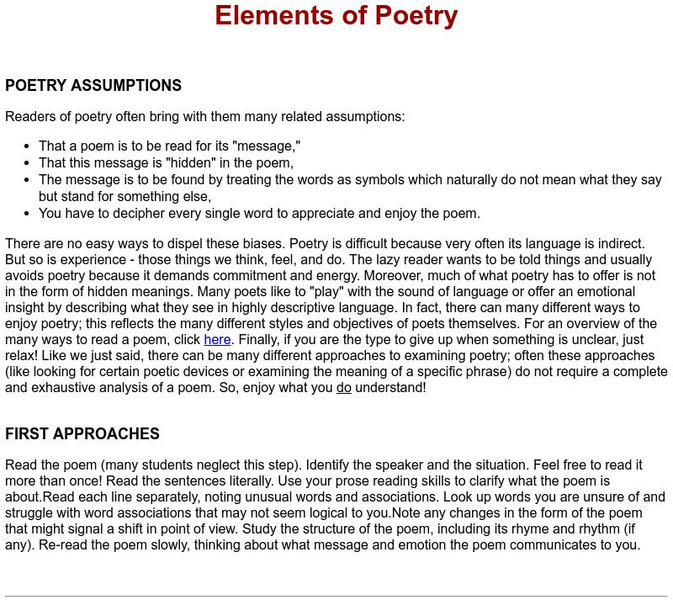



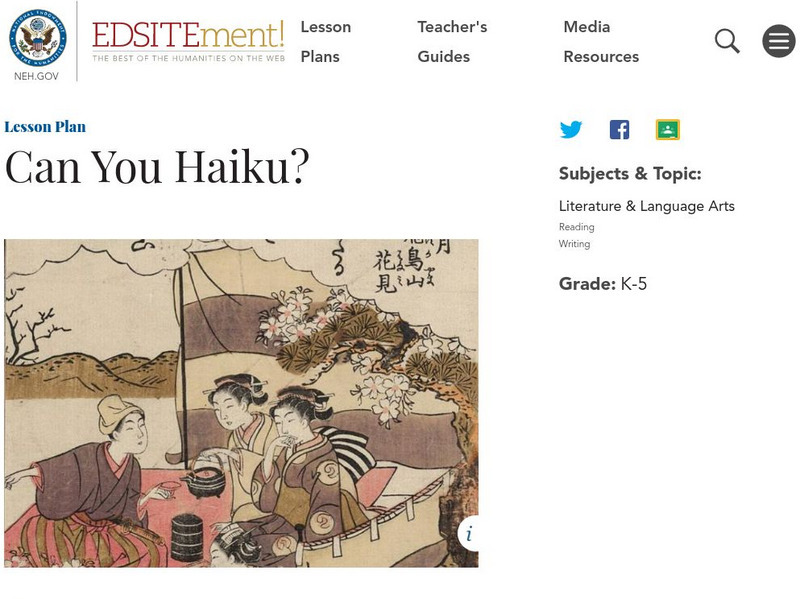


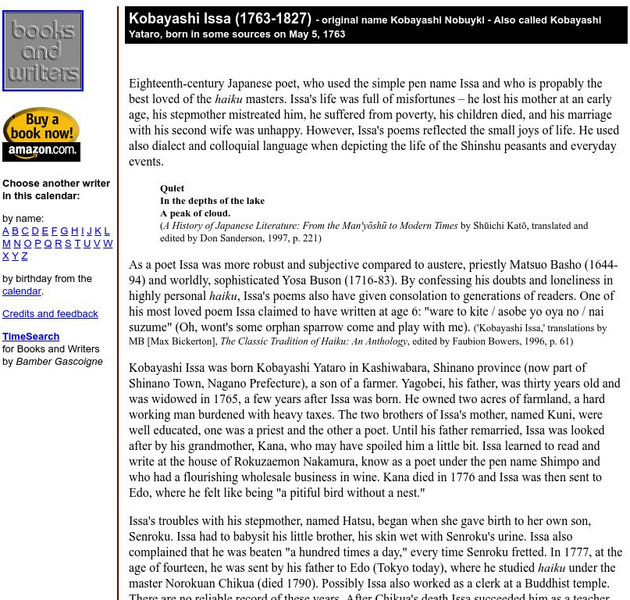

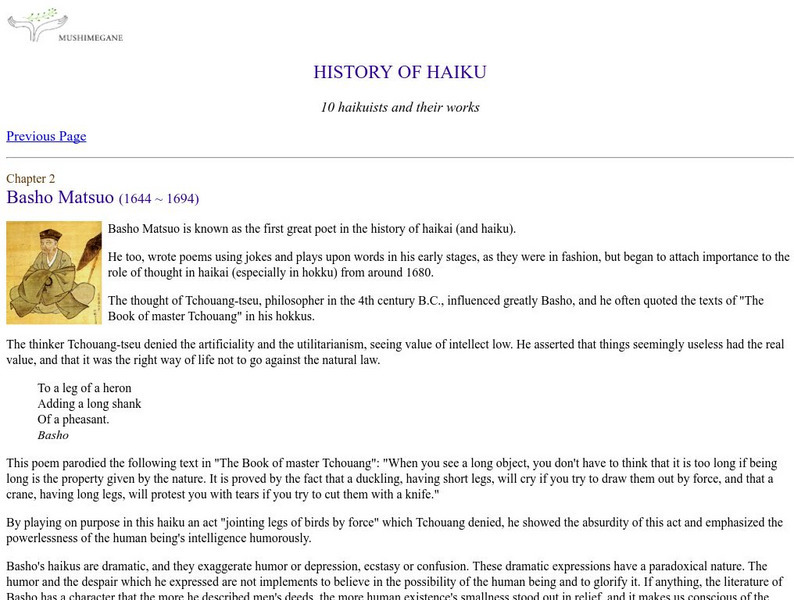


![Abcteach: How to Haiku [Pdf] Unknown Type Abcteach: How to Haiku [Pdf] Unknown Type](https://content.lessonplanet.com/knovation/original/117950-6b875e72e2467cd18a3c5b5fde96f9b1.jpg?1661360823)
